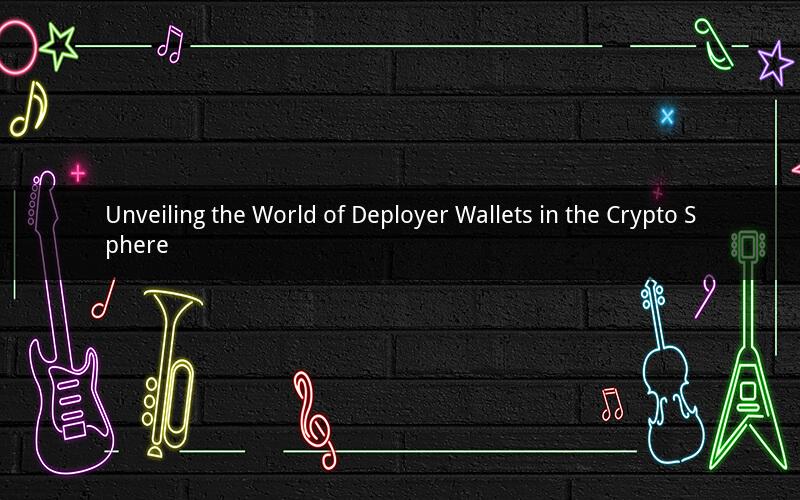
In the rapidly evolving crypto landscape, the term "deployer wallet" has gained significant attention. But what exactly is a deployer wallet in the context of cryptocurrencies? This article delves into the intricacies of deployer wallets, their role in the crypto ecosystem, and how they contribute to the decentralized finance (DeFi) revolution.
What is a Deployer Wallet?
A deployer wallet is a type of digital wallet designed to facilitate the deployment of smart contracts on blockchain platforms, primarily Ethereum. It is an essential tool for developers and enthusiasts in the crypto space, enabling them to create, test, and deploy decentralized applications (DApps) and smart contracts with ease.
The primary function of a deployer wallet is to generate the necessary private keys and addresses required for deploying smart contracts. These private keys are crucial for interacting with the blockchain, as they provide the owner with the authority to control and manage the deployed contracts.
How Does a Deployer Wallet Work?
Deployer wallets operate by utilizing private keys to sign transactions on the blockchain. When a developer wants to deploy a smart contract, they use their deployer wallet to create a transaction that includes the contract's bytecode, constructor arguments, and gas limit.
Once the transaction is signed using the private key, it is broadcast to the network, where miners validate it and add it to the blockchain. The deployed contract is then accessible to users and can be interacted with using its unique address.
Popular Deployer Wallets
Several deployer wallets have emerged in the crypto space, each offering unique features and functionalities. Here are some of the most popular deployer wallets:
1. MetaMask: MetaMask is a widely-used browser extension that serves as a deployer wallet for Ethereum-based applications. It allows users to manage their Ethereum accounts, interact with DApps, and deploy smart contracts.
2. Truffle Suite: Truffle is a popular development framework for Ethereum that includes a deployer wallet called Truffle HD wallet. It supports multiple blockchain platforms and offers a range of tools for developing, testing, and deploying smart contracts.
3. Hardhat: Hardhat is an open-source Ethereum development environment that includes a deployer wallet called Hardhat Network. It provides a local Ethereum network for testing and deploying contracts, making it an excellent choice for developers looking to streamline their development process.
4. Infura: Infura is a cloud-based infrastructure provider for Ethereum and other blockchains. It offers a deployer wallet called Infura Wallet, which allows users to deploy smart contracts and interact with DApps on the Ethereum network.
The Role of Deployer Wallets in the Crypto Ecosystem
Deployer wallets play a crucial role in the crypto ecosystem by enabling the creation and deployment of smart contracts. Here are some key aspects of their importance:
1. Decentralization: Deployer wallets contribute to the decentralized nature of blockchain technology by allowing developers to deploy smart contracts without relying on centralized authorities.
2. Innovation: By providing a platform for deploying smart contracts, deployer wallets foster innovation in the crypto space, enabling the creation of new DApps and financial products.
3. Security: Deployer wallets often incorporate advanced security features, such as multi-factor authentication and private key management, to protect users' assets and prevent unauthorized access.
4. Accessibility: Deployer wallets make it easier for developers to create and deploy smart contracts, reducing the barrier to entry for those interested in the crypto space.
5. Community: Deployer wallets contribute to the growth of the crypto community by providing tools and resources that empower developers and users to engage with blockchain technology.
Frequently Asked Questions (FAQs)
1. Q: Can a deployer wallet be used to interact with any blockchain platform, or is it limited to Ethereum?
A: Deployer wallets are primarily designed for Ethereum, but some wallets, like Truffle and Hardhat, support multiple blockchain platforms.
2. Q: How secure are deployer wallets, and what measures can be taken to protect private keys?
A: Deployer wallets are generally secure, but it's crucial to use strong passwords, enable multi-factor authentication, and store private keys in a safe and secure location.
3. Q: Can a deployer wallet be used to withdraw funds from a blockchain?
A: No, a deployer wallet is solely for deploying smart contracts and managing interactions with the blockchain. To withdraw funds, users must use a standard wallet that supports the respective blockchain.
4. Q: What is the difference between a deployer wallet and a regular cryptocurrency wallet?
A: While both types of wallets allow users to interact with the blockchain, a deployer wallet is specifically designed for deploying smart contracts, while a regular cryptocurrency wallet is used for storing and managing cryptocurrencies.
5. Q: Can a deployer wallet be used for testing purposes?
A: Yes, many deployer wallets, such as Truffle and Hardhat, offer local Ethereum networks for testing purposes, allowing developers to test their smart contracts before deploying them to the main network.
In conclusion, deployer wallets are an essential tool for developers and enthusiasts in the crypto space, enabling the creation and deployment of smart contracts on blockchain platforms like Ethereum. As the crypto ecosystem continues to evolve, deployer wallets will likely play an increasingly significant role in fostering innovation and decentralization.